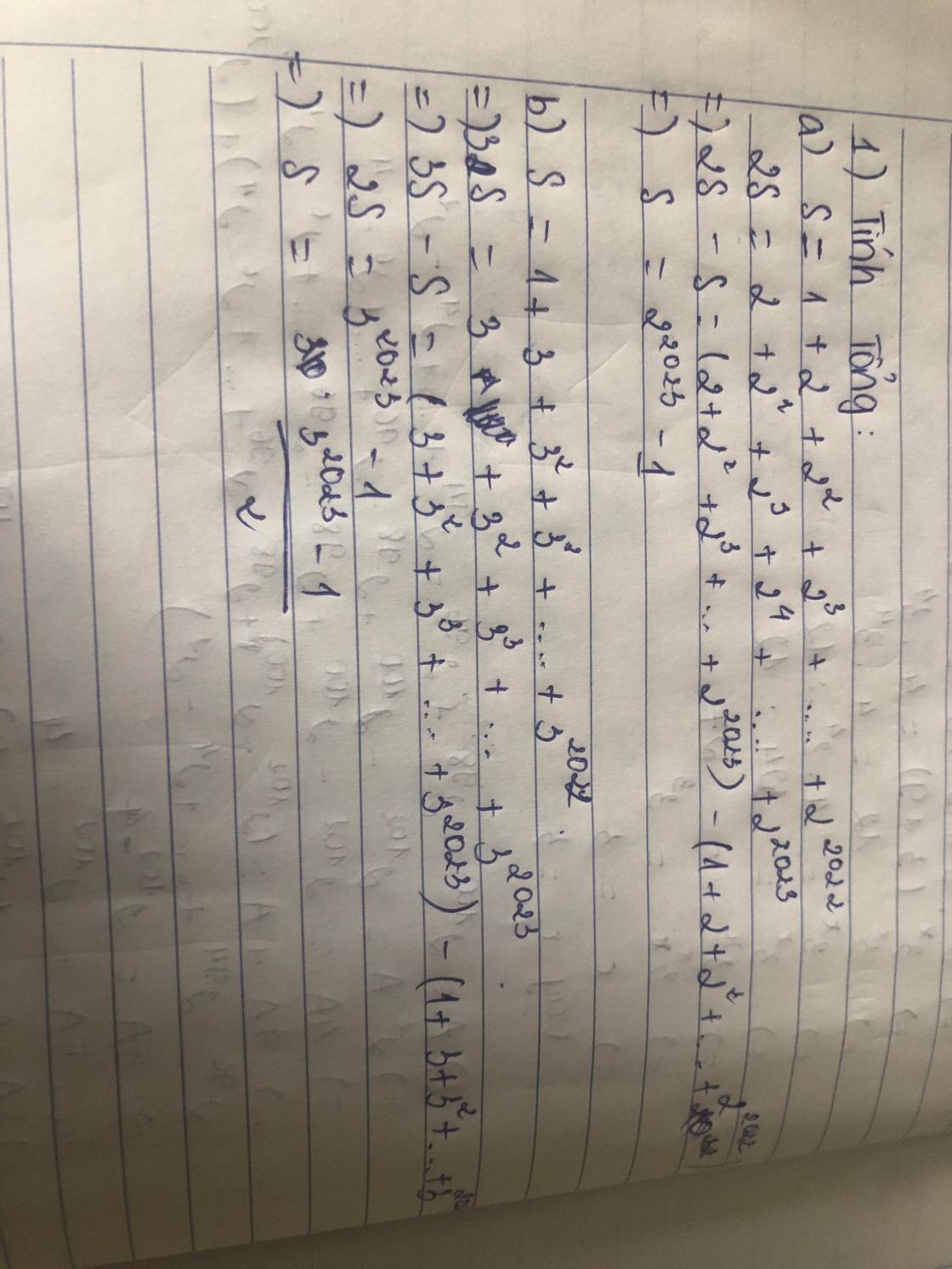
Hãy nhập câu hỏi của bạn vào đây, nếu là tài khoản VIP, bạn sẽ được ưu tiên trả lời.


Lời giải:
PT $\Leftrightarrow (\frac{x+1}{2022}+1)+(\frac{x+2}{2021}+1)+...+(\frac{x+23}{2000}+1)=0$
$\Leftrightarrow \frac{x+2023}{2022}+\frac{x+2023}{2021}+...+\frac{x+2023}{2000}=0$
$\Leftrightarrow (x+2023)(\frac{1}{2022}+\frac{1}{2021}+...+\frac{1}{2000})=0$
Dễ thấy tổng trong () luôn dương
$\Rightarrow x+2023=0$
$\Leftrightarrow x=-2023$

240-[23+(13+24.3-x)]=132
240-[23+(13+168-x)]=132
240-[23+(181-x)]=132
|
x-8:4-(46-23.2+6.3)=0
\(x-8:4-\left(46-23.2+6.3\right)=0\)
\(x-2-\left(46-46+18\right)=0\)
\(x-2-18=0\)
\(x-2=0+18\)
\(x-2=18\)
\(x=18+2\)
\(x=20\)



5:
a: \(3^{2n}=\left(3^2\right)^n=9^n\)
\(\left(2^{3n}\right)=\left(2^3\right)^n=8^n\)
=>\(3^{2n}>2^{3n}\)
b: \(199^{20}=\left(199^4\right)^5=1568239201^5\)
\(2003^{15}=\left(2003^3\right)^5=8036054027^5\)
mà \(1568239201< 8036054027\)
nên \(199^{20}< 2003^{15}\)
4: \(100< 5^{2x-1}< 5^6\)
mà \(25< 100< 125\)
nên \(125< 5^{2x-1}< 5^6\)
=>3<2x-1<6
=>4<2x<7
=>2<x<7/2
mà x nguyên
nên x=3

a) 2/2.5 + 2/5.8 + 2/8.11 + ... + 2/x(x+3) = 7/23
3/2.5 + 3/5.8 + 3/8.11 + ... + 3/x(x+3) = 21/46
1/2 - 1/5 + 1/5 - 1/8 + 1/8 - 1/11 + ... + 1/x - 1/x+1 = 21/46
1/2 - 1/x+1 = 21/46
=> 1/x+1 = 1/23
=> x + 1 = 23
=> x = 22
Vậy x = 22.
b) 3/4 . x - 1/5 = 7/4 . x + 11/5
3/4 . x - 7/4 . x = 1/5 + 11/5
x (3/4 - 7/4) = 12/5
-x = 12/5
x = -12/5
Vậy x = -12/5.

Bài 1.
\(a,\left(2^4\cdot3\cdot5^2\right):\left\{450:\left[450-\left(4\cdot5^3-2^3\cdot5^2\right)\right]\right\}\)
\(=\left(16\cdot3\cdot25\right):\left\{450:\left[450- \left(4\cdot125-8\cdot25\right)\right]\right\}\)
\(=\left(48\cdot25\right):\left\{450:\left[450-\left(500-200\right)\right]\right\}\)
\(=1200:\left[450:\left(450-300\right)\right]\)
\(=1200:\left(450:150\right)\)
\(=1200:3\)
\(=400\)
\(---\)
\(b,3^3\cdot5^2-20\left\{90-\left[164-2\cdot\left(7^8:7^6+7^0\right)\right]\right\}\)
\(=27\cdot25-20\left\{90-\left[164-2\cdot\left(7^2+1\right)\right]\right\}\)
\(=675-20\left\{90-\left[164-2\cdot\left(49+1\right)\right]\right\}\)
\(=675-20\left[90-\left(164-2\cdot50\right)\right]\)
\(=675-20\left[90-\left(164-100\right)\right]\)
\(=675-20\left(90-64\right)\)
\(=675-20\cdot26\)
\(=675-520\)
\(=155\)
\(---\)
\(c,\left[\left(18^7:18^6-17\right)\cdot2022-1986\right]\cdot5\cdot1^{2022}-13^2\cdot2020^0\)
\(=\left[\left(18-17\right)\cdot2022-1986\right]\cdot5\cdot1-169\cdot1\)
\(=\left(1\cdot2022-1986\right)\cdot5-169\)
\(=\left(2022-1986\right)\cdot5-169\)
\(=36\cdot5-169\)
\(=180-169\)
\(=11\)
Bài 2.
\(a) (2^x+1)^2+3\cdot(2^2+1)=2^2\cdot10\\\Rightarrow (2^x+1)^2+3\cdot(4+1)=4\cdot10\\\Rightarrow (2^x+1)^2+3\cdot5=40\\\Rightarrow (2^x+1)^2+15=40\\\Rightarrow (2^x+1)^2=40-15\\\Rightarrow (2^x+1)^2=25\\\Rightarrow (2^x+1)^2= (\pm 5)^2\\\Rightarrow \left[\begin{array}{} 2^x+1=5\\ 2^x+1=-5 \end{array} \right.\\ \Rightarrow \left[\begin{array}{} 2^x=4\\ 2^x=-6 (vô.lí) \end{array} \right. \\ \Rightarrow 2^x=2^2\\\Rightarrow x=2\)
Vậy \(x=2\).
\(---\)
\(b)3\cdot(x-7)+2\cdot(x+5)=41\\\Rightarrow 3\cdot x+3\cdot(-7)+2\cdot x+2\cdot5=41\\\Rightarrow 3x-21+2x+10=41\\\Rightarrow (3x+2x)+(-21+10)=41\\\Rightarrow 5x-11=41\\\Rightarrow 5x=41+11\\\Rightarrow 5x=52\\\Rightarrow x=\dfrac{52}{5}\)
Vậy \(x=\dfrac{52}{5}\).
\(Toru\)
